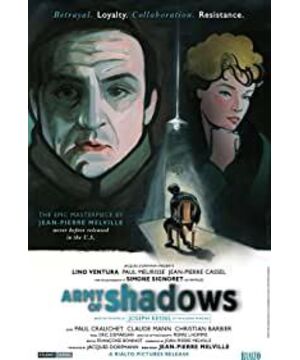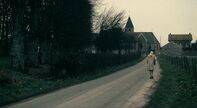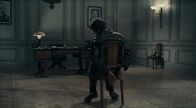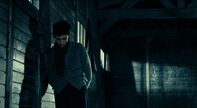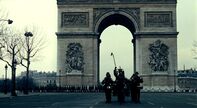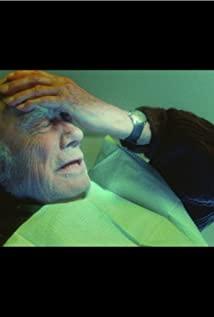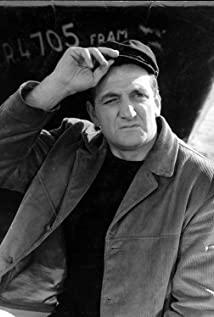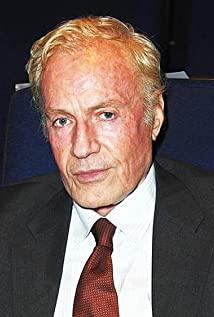By Jonathan Rosenbaum (Chicago Reader)
Translator: csh
The translation was first published in "Iris"
Around 1971, Jean-Pierre Melville said: "I sometimes read comments, 'Melville is making a Bressonian film', sorry, I think it was Bresson Been making Melville movies."
Melville's statement - echoed by critic Andre Bazin, who is said to have endorsed it by Robert Bresson himself - may seem shocking. Melville is best known for his eight feature noirs, each of which is very stylized and artful, qualities that seem to match the ostensibly embodied, neorealist Bresson films. Features are very different. More importantly, however, are the commonalities between the two men: their styles, themes and philosophical stances all trace directly back to their experiences during World War II.
Between 1940 and 1941, before the occupation of France, Bresson spent nine months in a German internment camp. In one of his greatest films, Death Row (1956), he mentioned his imprisonment. Melville, whose real name was Jean-Pierre Granbach, joined the Resistance in the early 1940s - first by changing his Jewish surname to Cartier, and then, in tribute to Herman Melville, Changed it to Melville - and three of his thirteen feature films, shot after the war, dealt with the theme of the German occupation forces. "The Silence of the Sea" (1948) was his first feature film, while "Father Leon Mohan" (1961) brought him the greatest commercial success of his career. However, his Shadow Force (1969) is the only work on the Resistance. Now, the film will be released in the United States for the first time.
Both Melville and Bresson's work are fraught with despair, but "Shadow Army" has devastating power. At first, I didn't even want to admit it was a great movie, but I now think it's probably Melville's best work. There is a personality in me that resists the masculine stoicism of most of Melville's films, and the hysteria that lurk in it. I've also always preferred his black and white films to his fancy color films. But in this film, his use of color is so subdued that I even misremembered it as a black and white film. This two-and-a-half-hour film chronicles the increasingly difficult decisions made by a middle-aged resistance leader named Jebier (Lino Ventura) and his comrades, as well as Ultimately futile results. Among other things, they must decide whether to assassinate a noble and brave member of the Resistance who was captured and tortured by the Gestapo - they don't know if she's broken, but they want to make sure she doesn't. Her ordeal continues throughout the film, though Melville refuses to reveal anything about it. Instead, he focused on some sufficiently horrific results.
Shadow Forces is based on the novel of the same name by Joseph Kessel (who is also the original author of Luis Buñuel's very different "Beauty in the Day"), which Melville wrote for the first time in 1943 After reading this novel, it is said that the original novel is much more optimistic than the movie. Like his other feature films, this one also suggests that the extreme loneliness of most characters can be explained by some kind of hidden wound - one of Melville's favorite films, "The End of the Night" According to rumors, he watched this work dozens of times. This theme tempts the viewer to speculate about the autobiographical nature of it. Unlike Bresson, he hid most of his life from the public eye. But in another dimension, he is also an exhibitionist, who uses a covert method to project a fictional character. (For the history of this masquerade, see the novelist Parvesco in Jean-Luc Godard's Exhaustion, in which Melville played the role and admitted This is himself.)
All of Melville's writings are rich in subtexts, and in Shadow Forces, "Holocaust" is probably one of the main ones. For some Jews who survived the Holocaust, there was one of the deepest traumas—the guilt they felt because so many others were not spared. This work is more of a metaphysical defeatism than any other film I can think of (with the possible exception of Cataclysm [1985]). Cataclysm director Claude Lanzmann (who is also editor of Modern magazine, founded in 1945 by Jean-Paul Sartre and Simone de Beauvoir) was in Growing up in the shadow of existentialism -- so did Melville, who lived in some similar circle of people. (Existentialist diva Juliet Greco is a friend of Melville's and starred in his third feature film.) Existentialists embrace the need to make hard choices, and it is this This necessity makes the Holocaust awaken far more than what Schindler's List achieves. "Schindler's List" is comforting, not disturbing. This necessity also explains why Shadow Force, like Hitchcock's best films, creates so much suspense through moral conflict.
I had a hard time reconciling the realism of Shadow Troopers with the pretentiousness of Melville's noir films. But then I read a 1982 review by Dave Kyle for Reader magazine in which he discussed The Silence of the Sea and Melville's first noir film, Bob the Gambler (1956 ): "Most of Melville's work is constructed on a paradox: in a silent self-restraint there is certainty, strength and integrity, but also a certain death; when this When this silence is broken - and it must be broken - life and emotion enter this field, but they are only completely destroyed. Melville's film, about the invasion of the closed world, is This violation is both necessary and deadly.” Whether or not Kyle had seen Shadow Forces before writing this piece, he captured Melville’s melding of film noir and war.
Kyle's claims are abstract and metaphysical. But the most devastating part of Shadow Force is how physically we react when we see the horrific decisions faced by members of the Resistance. With her persuasive performance, Simon Signere interprets the noble and brave fighter mentioned earlier. We experience the most painful bodily reactions in recognizing this character's story. Signeret's character has always kept her involvement in the underground a secret, even from her husband and daughter. Although Gepier advised her not to bring a picture of her own daughter, when the Gestapo discovered the photo, we found that she did not follow his advice. They threatened her with forcing her daughter into prostitution if she did not confess. In Kyle's words, the mother's photo became a necessary and fatal violation of the closed world.
View more about Army of Shadows reviews


